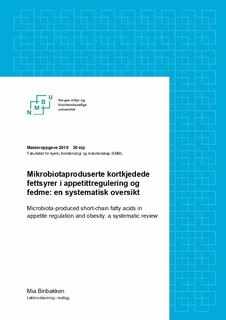| dc.contributor.advisor | Carlsen, Harald | |
| dc.contributor.advisor | Bøhn, Siv Kjølsrud | |
| dc.contributor.author | Biribakken, Mia | |
| dc.date.accessioned | 2019-08-28T12:49:09Z | |
| dc.date.available | 2019-08-28T12:49:09Z | |
| dc.date.issued | 2019 | |
| dc.identifier.uri | http://hdl.handle.net/11250/2611451 | |
| dc.description.abstract | Obesity has gained worldwide epidemiological status, contributes to major health risks, and costs to society. For this reason, there is increasing interest for finding new methods to prevent and treat this disease. Obesity is associated with an imbalance in the composition of gut bacteria. The transfer of such an unbalanced microbiota to germ-free mice has led to weight gain and the development of obesity. As a result, researchers have suggested microbiota and their metabolites as a contributor in the regulation of overweight and obesity. The short-chain fatty acids (SCFAs) acetate, propionate and butyrate are the metabolites most commonly produced by fermentation of non-digestible carbohydrates in the intestine. Animal studies have shown that these may have a direct effect on the appetite-regulating center of the brain or stimulate the secretion of appetite hormones which in turn can lead to weight loss.
In this thesis, a literature study was conducted to investigate the evidence that microbiotaproduced SCFAs are important for obesity by regulating appetite in humans. A systematic search was conducted in the spring of 2019 using PubMeds databases, with various combinations of search terms within the topics of: short-chain fatty acids, appetite and clinical trail. | nb_NO |
| dc.description.abstract | Fedme har fått verdensomspennende epidemiologisk status, bidrar til økt helserisiko og er en stor kostnad for samfunnet. På grunn av dette er det økende interesse for å finne nye metoder for å forebygge og behandle sykdommen. Fedme er assosiert med en ubalanse i sammensetningen av tarmbakterier. Overføring av en slik ubalansert mikrobiota til bakteriefrie mus har ført til vektøkning og utviklingen av fedme. På grunn av dette har forskere foreslått mikrobiota og deres metabolitter som en bidragsyter i reguleringen av overvekt og fedme. De kortkjedede fettsyrene (SCFA) acetat, propionat og butyrat er metabolittene det produseres mest av ved fermentering av ufordøyelige karbohydrater i tarmen. Dyrestudier har vist at disse kan ha en direkte virkning på det appetittregulerende senteret i hjernen eller stimulere utskillelsen av appetitthormoner som igjen kan føre til vektnedgang.
I denne oppgaven ble det gjennomført en litteraturstudie for å undersøke evidensen for at mikrobiotaproduserte SCFAer har betydning for fedme gjennom å regulere appetitt i mennesker. Et systematisk søk ble gjennomført våren 2019 i PubMeds database, med ulike kombinasjoner av søkeord innenfor emnene: kortkjedede fettsyrer, appetitt og klinisk studie. | nb_NO |
| dc.language.iso | nob | nb_NO |
| dc.publisher | Norwegian University of Life Sciences, Ås | nb_NO |
| dc.rights | Attribution-NonCommercial-NoDerivatives 4.0 Internasjonal | * |
| dc.rights.uri | http://creativecommons.org/licenses/by-nc-nd/4.0/deed.no | * |
| dc.subject | Appetitt | nb_NO |
| dc.subject | Fedme | nb_NO |
| dc.subject | Mikrobiota | nb_NO |
| dc.subject | Appetite | nb_NO |
| dc.subject | Obesity | nb_NO |
| dc.subject | Microbiota | nb_NO |
| dc.title | Mikrobiotaproduserte kortkjedede fettsyrer i appetittregulering og fedme : en systematisk oversikt | nb_NO |
| dc.title.alternative | Microbiota-produced short-chain fatty acids in appetite regulation and obesity : a systematic review | nb_NO |
| dc.type | Master thesis | nb_NO |
| dc.description.localcode | M-LUN | nb_NO |

